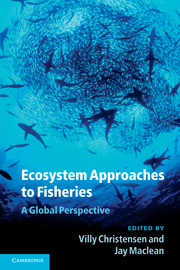Book contents
- Frontmatter
- Contents
- List of contributors
- Foreword
- Preface
- Acknowledgments
- 1 Introduction: toward ecosystem-based management of fisheries
- I Life in the oceans
- 2 The oxygen constraint
- 3 Organizing and disseminating marine biodiversity information: the FishBase and SeaLifeBase story
- 4 The science in FishBase
- II Evaluating impact on marine life
- III Managing living resources
- IV The human side
- V Impacting policy
- Index
- References
2 - The oxygen constraint
Published online by Cambridge University Press: 05 June 2012
- Frontmatter
- Contents
- List of contributors
- Foreword
- Preface
- Acknowledgments
- 1 Introduction: toward ecosystem-based management of fisheries
- I Life in the oceans
- 2 The oxygen constraint
- 3 Organizing and disseminating marine biodiversity information: the FishBase and SeaLifeBase story
- 4 The science in FishBase
- II Evaluating impact on marine life
- III Managing living resources
- IV The human side
- V Impacting policy
- Index
- References
Summary
In trying to understand processes and mechanisms regulating ocean ecosystems, we humans, being terrestrial mammals, naturally rely on intuitions and common sense notions formed by our terrestrial experiences as well as on our inherent terrestrial-mammalian evolved capacities and inclinations. As a result, many aspects of life that may be unique to organisms evolved and operating within marine situations may tend to elude our intellectual grasp and even our notice.
In the early 1980s, I worked with Daniel Pauly and other colleagues on developing an international collaborative “Ocean Science and Living Resources” (OSLR) program (Bakun et al., 1982). This experience presented me with, among other things, an exposure to Pauly's developing theory on the special role of oxygen in the marine situation (Pauly, 1979, 1981, 1984, 2010). The interest was on individual-organism-scale biological issues, such as growth rate and maturation timing. Not being a biologist, but rather an oceanographer habitually focused on regional population-scale issues, I found the notions intriguing while not yet beginning to apprehend their significance to the particular questions that were consuming my own attention.
But, the “seeds” were planted in my mind. Daniel's early insights on the size-related oxygen issues faced by fishes in the ocean led me over the years to the notions outlined here, and are an example of how my own joy in the “ocean quest” has been enriched by his influence.
Information
- Type
- Chapter
- Information
- Ecosystem Approaches to FisheriesA Global Perspective, pp. 11 - 23Publisher: Cambridge University PressPrint publication year: 2011
References
Accessibility standard: Unknown
- 7
- Cited by
